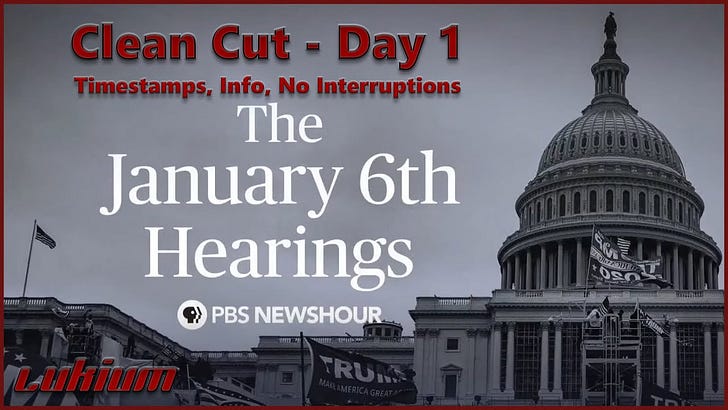First off, Happy New Year!
Look, this piece isn’t meant to be entertaining. It’s not meant to be fun. It’s not about clicks, shares, or going viral. This is a serious conversation—one that cuts to the heart of what it means to be an American and whether our Republic, as we know it, can survive.
I’m going to take my time here. I’m going to walk you through each point carefully, giving you enough space to think and reflect. This isn’t a soundbite, and it’s not a quick fix. It’s a call to action for everyone who cares about this country and its future.
I hope—no, I urge—you to stick with me to the end, because the decisions we make today will determine whether we still have a United States of America tomorrow.
Before we dive in, I want to ask something important of you. For the duration of this video—or at least until the very end—try, to the best of your ability, to set aside the people currently in politics. Set aside your feelings about any individual or politician, the party you identify with, and anything you’ve heard in the media—whether it’s mainstream or independent.
What I’m asking is simple: follow me purely on the facts and reasoning I’m going to offer. Don’t just take my word for it—feel free to pause, or later, fact-check everything I say against original sources, like the Constitution, court documents, and historical records. I’ll do my best to link as much as possible at the end to make this easier.
But most importantly, don’t form an opinion or make a decision based on what anyone else has told you—not the media, not politicians, not even me. Take what I share, examine it critically, and ask yourself, after verifying it: Is the reasoning sound?
Now, I know I’m asking a lot of you—to set aside your thoughts about people, politics, and the media, and just follow me on the reasoning. So, it’s only fair that I give something in return. Let me tell you a bit about myself so you can decide if I deserve this deal.
As you can probably tell from my accent, I wasn’t born in the U.S. I lived in Brazil until I was 15, and then my family moved here. That was over 20 years ago. In that time, I helped raise my younger brother—he’s 10 years younger than me—and he went on to serve as a Marine. That’s probably the thing I’m most proud of about him.
Me? After going through high school, I actually took the ASVAB and was on my way to enlisting in the Navy to become a Nuclear Engineer. But at the last minute, I was disqualified because I have Crohn’s disease. From there, I had to find another path. I worked a few different jobs, including banking for a few years while pursuing a business degree, but eventually, I dropped out to start my own small business. That’s what I do now—build something for myself and my family, just like millions of others trying to live their version of the American Dream.
Speaking of family, I’ve been married to my amazing wife for six years now. She’s been my biggest supporter through everything, and I couldn’t have done any of it without her. We have two Akitas, Ares and Athena, who are like children to us. The sweetest beasts you’ll ever meet
Anyway, let me make one thing absolutely clear: not only have I said the Pledge of Allegiance countless times, but just like I was willing to put my life on the line for this country back when I tried to enlist, I still would today—without a second thought, no hesitation.
And here’s the key: it’s not because of allegiance to any person, or any party, or any movement. Not because of one policy, belief, or idea. No, it’s because of our Constitution. What this Constitution has achieved—despite its flaws at the start and the work that’s still left to be done—is the best humanity has ever achieved. It’s nothing short of a miracle.
Now, to be completely honest with you—I’m not even a U.S. citizen yet. I currently hold a Green Card. As we continue, you’ll probably hear me say things like ‘we’ when I talk about Americans or ‘our’ when I talk about the Constitution, if I haven’t already. If you’ll indulge me, while not yet technically a citizen, I’d like to borrow the title the time I’m with you in the spirit of how I feel about our country as we continue on this journey together.
There’s a quote I really believe in—I’m not sure who said it first, but it’s stuck with me: ‘Tell me what a man is willing to die for, and I’ll tell you his worth.’ So, I hope that through my story and my beliefs, that I’ve earned your attention and that you’ll take me up on this deal. I also hope that you and I share the same passion for our Constitution. So, if you’re still with me, I would like to start with a thought experiment.
Imagine this: I, someone born outside the United States, decide to run for President. Against all odds, I win—overwhelmingly. I’m not talking about a close race here; I win by a landslide. Let’s say I secure 500 electoral votes. The people have spoken, right? It’s what they want.
But here’s the question: Should I be seated as President? Let me remind you of what the Constitution says. Article II, Section 1 is crystal clear: only a natural-born citizen is eligible to hold the office of President. That’s not up for debate; it’s written in black and white.
Now, imagine Congress decides to certify my election anyway, arguing that the sheer number of votes makes it legitimate. Or picture the Supreme Court stepping in, creating some kind of carveout to allow it. Maybe they say, ‘This situation is extraordinary, so let’s bend the rules.’
What would that mean for our Constitution?
Let me be blunt: it would be a complete violation. A direct attack. And, probably, a fatal one. If the people sworn to uphold the Constitution—whether it’s Congress, the Executive, or the Supreme Court—can just decide to ignore or circumvent parts of it they don’t like, then what’s the point of having a Constitution at all?
Now, remember, I’m no legal scholar, I’m just a college dropout running a small business, I’m just a guy who cares deeply about this country and wants to understand how we preserve what makes it great. So, if someone out there who’s qualified to tell me where I’m wrong as we continue, please, educate me.
My understanding is that the Supremacy Clause exists to make sure that the Constitution remains the highest law of the land, binding everyone who takes an oath to it. If we allow even one exception—no matter how popular or politically convenient it might seem—we’re not just bending the rules; we’re tearing the whole Constitution apart. The Constitution isn’t a buffet where you pick and choose the parts you like. It’s all or nothing.
So, as much as I might want to be President in this hypothetical scenario, and as much as people might want me to be, it doesn’t matter. The Constitution says I can’t, and that has to be the end of it. The only way to change that would be through an amendment—following the process the Constitution itself lays out.
Think about this for a moment. If Congress or the courts could override something as fundamental as this just because they wanted to, then nothing in the Constitution is truly protected. Every clause, every amendment, every principle could be swept aside the moment it’s inconvenient. And if that’s the case, then the Constitution isn’t the foundation of our Republic—it’s just a piece of paper.
If we go down that road, if we allow even one fatal breach like this, then the United States as we know it—the rule of law, the system of checks and balances, the very idea of constitutional government—ceases to exist.
This is why it’s so important to protect the Constitution, even when it’s inconvenient, even when it means doing something unpopular. Because if the Constitution falls, so does everything else.
If you’re still with me, I hope that in going through this thought experiment that we agree on two fundamental ideas:
1. The Supremacy Clause binds every branch of government—Congress, the Executive, and the Judiciary—to enforce, without question or exception, every article and amendment of the Constitution until such a time as an amendment is ratified to change it.
2. Any failure by any branch to do this would be a direct attack on the Constitution and on the rule of law. More specifically, ignoring or circumventing a clause as clear as the requirement that only a natural-born citizen can be President would set a precedent that would, essentially, mark the end of the Constitution itself.
But this isn’t just theoretical. To understand why these principles are so important—and how they’ve already shaped our nation—we need to look at one of the most transformative moments in American history: Reconstruction. Let’s dive into the 13th and 14th Amendments and what they meant for the Constitution and the country.
Let’s start with the 13th Amendment. It was ratified on December 6, 1865, and it’s one of the most straightforward parts of the Constitution. It has just two sections. The first ends slavery, and the second states: ‘Congress shall have power to enforce this article by appropriate legislation.’
Now, why is it important to review this? Because it helps us understand what it means for a clause to be self-executing—using a non-controversial example, like the abolition of slavery.
Since the ratification of the 13th Amendment, Congress has passed many laws related to it. These include the Anti-Peonage Act of 1867 and the Mann Act as recently as 1986. But here’s what hasn’t happened: Congress has never passed a law to define how to ‘determine’ whether slavery exists for the purposes of enforcing the 13th Amendment. Nor has it passed a law dictating how states may or may not make that determination, or how they may enforce it. This is despite the fact that Section 2 explicitly gives Congress the power to enforce the article through legislation.
Here’s why that’s important: If the 13th Amendment required an act of Congress to make it enforceable—if Section 2 meant it couldn’t stand on its own—then two things would logically follow:
1. The 13th Amendment would have no real effect beyond being a ‘declaration of intent.’
2. More disturbingly, it would mean slavery is technically still legal, because no legislation has ever been passed to define or enforce it in those terms.
But in this case, it’s obvious to any observer that this would be absurd. The ratification of the 13th Amendment didn’t just symbolize the end of slavery; it legally abolished it, full stop. That’s true even though some issues related to it persisted well into the 20th century.
So, what does this tell us? It shows that the 13th Amendment is self-executing. Its ratification immediately and fundamentally changed the law, even without additional Congressional action.
So, before we move on, let’s make one thing absolutely clear: when the Constitution says, ‘Congress shall have power to enforce this article by appropriate legislation,’ it means Congress can pass additional laws to support and enforce the attached clauses. It does not mean that those clauses are just declarations of intent with no teeth, waiting for further legislation to give them meaning.
Now, let’s move on to the 14th Amendment, the second of the Reconstruction Amendments. It was ratified on July 9, 1868. While the 13th Amendment is relatively straightforward, the 14th is far more complex. It’s had a profound impact on legislation and constitutional interpretation since its ratification, touching nearly every corner of American life.
But for our journey today, we’re going to focus on just a few specific parts of it.
Let’s start with Section 5. It reads: ‘The Congress shall have power to enforce, by appropriate legislation, the provisions of this article.’ Now, isn’t that interesting? It’s almost word for word the same as Section 2 of the 13th Amendment. And thanks to the beauty of our legal system, we interpret the Constitution in a way that ensures consistency. When the same language appears in two places, it has to mean the same thing and have the same effect.
So, just like with the 13th Amendment, this enforcement clause doesn’t mean the 14th Amendment is some vague ‘declaration of intent’ waiting for Congress to pass additional laws to give it meaning. Whatever the 14th Amendment does, and we’ll get there shortly, Section 5 doesn’t weaken it or make it dependent on further legislation. The amendment is self-executing to the extent of its language. Otherwise, consistency would dictate, that the 13th Amendment did not in fact end slavery, and we know this not to be true.
Next, let’s take a look at Section 2 of the 14th Amendment to see its self-executing nature in action—this time in a mostly non-controversial setting: felon disenfranchisement and voting rights.
As a result of Section 2—which was reaffirmed by the Supreme Court in Richardson v. Ramirez in 1974—states have the authority to determine that individuals convicted of a crime can lose their right to vote. And here’s the key: there are no Acts of Congress that dictate how a state may or may not define someone as a criminal for these purposes, or how they may enforce such laws. Yet, states freely exercise this power.
For example, if a state determines someone is a felon, they can not only prevent that person from voting but also enforce that disenfranchisement however they see fit, such as barring the individual from casting a ballot entirely. And this isn’t limited to voting—it even touches on the ability to run for office. Take Florida, for instance: if you’re convicted of a felony there, you’re disqualified from running for federal office. But in New York, a felony conviction doesn’t necessarily prevent you from running for federal office.
Here’s where it gets even more interesting. The same actions in different jurisdictions can have different criminal implications. That means an act that leads to disenfranchisement under Section 2 in one state might not lead to the same result in another. The Constitution allows for this state-level determination and enforcement without requiring additional legislation from Congress. The reason is simple: even if determinations are different across jurisdictions, the impacted individual can always appeal their case all the way up to the Supreme Court, where it can be reviewed to ensure the civil rights provided to them by the constitution have not been violated in the process.
This is yet another example of how the 14th Amendment operates as self-executing, even in areas where states have significant discretion.
So, before we move from Section 2, let’s be absolutely clear: Section 2 of the 14th Amendment has long been understood as self-executing. It does not require any additional Act of Congress to establish how states can make determinations or enforce Section 2. This is true despite the language in Section 5, which simply empowers Congress to pass additional legislation if necessary. The law has functioned effectively for over a century without any such legislation.
This reinforces a key point: the 14th Amendment, like the 13th, is designed to operate with legal force immediately upon ratification, even without further action by Congress.
Now, I promise we’re reaching the destination in our history journey, but before we move to our final stop, let’s take a moment to recap the conclusions we should agree upon—unequivocally—up to this point:
1. The Constitution is an all-or-nothing proposition. If we can pick and choose which parts we want to follow, it’s no different than having no Constitution at all and just playing pretend.
2. The Supremacy Clause binds Congress, the Executive, and the Judiciary absolutely to every Article and Amendment of the Constitution. They have no choice but to follow it, regardless of the powers granted to each branch.
3. Amendments, like the 13th, can—and often are—self-executing, even when they contain language granting Congress the ability to pass additional laws. If this weren’t true, we’d be living in an absurd bizarro world where slavery is still technically legal. Furthermore, states are fully able to make their own determinations under such Amendments, even in the absence of additional Congressional legislation.
4. As it relates to the 14th Amendment, it has always been the law of the land—and further reinforced by Supreme Court precedent—that the Amendment is self-executing. States have the power to make determinations and enforce disqualifications based on Section 2, even if those determinations lead to different outcomes in different jurisdictions. And here’s the key: there’s nothing in the language of the 14th Amendment that says Section 2—or any section—should be treated differently in this regard. The fact that outcomes can vary from state to state is not a problem; it’s part of the system: because at the end of the day, you can always appeal a state decision up to the Supreme Court, where a final, consistent determination can be made.
With these principles in mind, we’re ready to move on to Section 3 and unpack what it means for the challenges we face today.
Let’s start by looking at the text of Section 3 of the 14th Amendment. It’s not very long:
‘No person shall be a Senator or Representative in Congress, or elector of President and Vice-President, or hold any office, civil or military, under the United States, or under any State, who, having previously taken an oath, as a member of Congress, or as an officer of the United States, or as a member of any State legislature, or as an executive or judicial officer of any State, to support the Constitution of the United States, shall have engaged in insurrection or rebellion against the same, or given aid or comfort to the enemies thereof. But Congress may by a vote of two-thirds of each House, remove such disability.’
Now, let’s break that down:
1. We start with a Broad Disqualification: While it lists a few specific examples, this section disqualifies anyone seeking to hold any office—civil or military, federal or state—if they meet the qualifications that follow. This essentially means any government position, full stop.
2. The disqualification has an Oath Requirement: The section applies only to individuals who have previously taken an oath to defend the Constitution of the United States.
3. There are Two Disqualifying Actions:
a. Engaging in rebellion or insurrection against the Constitution: This is crucial. It’s not just about insurrection against the land of United States, an agency, or a party or a building; it’s against the Constitution itself. Historically, insurrection refers to individuals engaging in forceful or illegal attempts to undermine a power structure—in this case, this means the laws and processes established by the Constitution.
b. The other disqualifying action is giving aid and comfort to enemies of the Constitution: This refers to providing assistance—whether material or symbolic—to the enemies of the Constitution. Since this clause appears in the very same sentence that addresses those engaging in insurrection or rebellion, it stands to reason that, if it applies to anyone, it applies first and foremost to those very same individuals just mentioned: the ones who have engaged in rebellion or insurrection against the Constitution.
4. There’s a potential for removing the disqualification: Congress can remove this disqualification, but only by a two-thirds vote in both the House and Senate.
5. There are no carveouts:
a. The text doesn’t make exceptions based on specific events or historical periods. It applies equally to all insurrections or rebellions, whether during the Civil War or any future event.
Let’s look at how this played out historically. After the Civil War and the ratification of the 14th Amendment, many former Confederate officers—both civil and military—were disqualified from holding office under Section 3. Here’s the key: there were no additional Acts of Congress to determine or enforce these disqualifications. They just were, full stop.
We know this because less than four years later, on May 22, 1872, Congress passed the Amnesty Act of 1872, lifting many of these disqualifications. Why would Congress bother passing such an act if Section 3 disqualification hadn’t been real, immediate, and enforceable in the first place?
For a couple of quick examples, consider what happened to William T. Coghlan and Joseph E. Wheeler—two former Confederates elected to the U.S. House of Representatives from Alabama in the early years of Reconstruction. Each arrived in Washington with an election certificate in hand, only to find out that winning the vote wasn’t enough if you were disqualified under Section 3. In Coghlan’s case, the House refused to seat him outright because of his Confederate service, and Wheeler, a former cavalry officer, faced a similar barrier in 1869. Both were effectively blocked from office on the grounds that they had once taken an oath to support the Constitution, then turned around and fought against it.
These—and other similar cases—show how Section 3 was taken very seriously. It required no further statute to say, “Hey, these guys are disqualified.” Congress simply exercised its constitutional responsibility to refuse them a seat. Then, in 1872, Congress decided to lift that disqualification for many ex-Confederates via the Amnesty Act—which is exactly what you’d expect if Section 3 had been self-executing all along.
And here’s what that tells us:
1. The disqualification existed. If it didn’t, why would Congress have needed to pass an act to remove it?
2. The disqualification was automatic. It came into effect simply because these individuals had engaged in insurrection or rebellion and had previously taken an oath to support the Constitution. There was no need for additional trials, votes, or legislation to enforce it.
So, let’s recap Section 3, its unequivocal historical record, and its self-executing nature. It doesn’t require additional Acts of Congress to determine or enforce its provisions. Just like the 13th Amendment, it operates with legal force immediately upon ratification, even though it contains a clause allowing Congress to pass supporting legislation if necessary.
We know this because we don’t live in a bizarro world where slavery is still legal, or where Confederate officers remained qualified to hold office until the Amnesty Act of 1872. If Section 3 wasn’t self-executing, why would Congress need an Amnesty Act in 1872? Why not just ignore it? The disqualifications existed—and they were enforced—without any additional Congressional action beyond the Amendment itself.
There’s one more crucial conclusion we can draw from Section 3: The only constitutionally permissible ways for someone who has engaged in insurrection or rebellion against the Constitution to be interacted with by other currently elected officials regarding their future holding of federal or state office are:
1. To stop that individual from taking office entirely.
2. For Congress to vote, with a two-thirds majority in both the House and Senate, to remove the disqualification.
Any other action—whether it’s swearing them into office, certifying their election, or otherwise enabling them to assume or retain power—would necessarily constitute a form of aid and comfort to that individual. And here’s where it gets even more ingenious.
If the second disqualifying act—providing aid or comfort to someone who engaged in insurrection or rebellion—applies as the Supremacy Clause requires, then anyone who takes such action would themselves become immediately disqualified from their current office. This disqualification would act as an instantaneous resignation, nullifying both their position and the action they attempted to take.
This isn’t just logically consistent; it’s an example of the brilliance and foresight of those who wrote the 14th Amendment. They built in a self-protecting mechanism to ensure that anyone who attempts to undermine the Constitution by enabling an insurrectionist would themselves be neutralized in the process. It’s a foolproof safeguard for the integrity of the Constitution. Where’s the precedent for this, you may ask. There has never been one, because we have never had to test this. As previously explained, every time up to this moment, Congress has always, without exception, reaffirmed their commitment to the Constitution and followed their duty under the Supremacy Clause to ensure that individuals disqualified by Section 3 did not take office even when they won elections.
This is why Section 3 is so critical to protecting the Constitution as a last line of defense against internal threats. Its self-executing nature ensures that our Republic has a built-in defense against those who seek to undermine it, now and in the future.
If you disagree with these conclusions, I encourage you to pause and reflect. Before moving forward, try to propose an alternative interpretation—one that is logically consistent, respects the text of the 14th Amendment, aligns with the historical record, honors the intelligence and competence of its framers, and doesn’t imply the Constitution intends itself to have a backdoor for its own demise. If you can’t, then consider what rejecting this logic means: a world where slavery remains legal because Congress didn’t pass a law, or where Confederate officers could hold office until Congress specifically acted years later. Neither reflects reality, and neither should reflect how we view Section 3 today.
To help us really absorb these ideas, let’s run another short thought experiment. Imagine this: the Amnesty Act of 1872 was never passed, and the disqualifications from the 14th Amendment were still in place. Now, suppose a former Confederate officer, disqualified under Section 3, decided to run for President—and somehow won the election.
1. Wouldn’t that disqualification hold the same legal weight as the one we agreed on earlier in my own hypothetical scenario, where I, a non-natural-born citizen, couldn’t take office? Of course it would. Just like my disqualification, this one would make it impossible for Congress to constitutionally certify the election without violating the Supremacy Clause. And wouldn’t the same hold true if SCOTUS tried to circumvent this disqualification with a legal carveout? Obviously, it would.
2. But here’s where it gets even more critical. In my case, the Constitution doesn’t specify a direct consequence for someone who might attempt to circumvent my disqualification—it presumably leaves that to impeachment as a general remedy. But when it comes to providing aid and comfort to an individual disqualified under Section 3, the Constitution does provide a built-in consequence: the immediate, self-executing disqualification or resignation of anyone attempting to enable that individual.
3. And think about this: What could possibly constitute a greater form of aid and comfort to an individual who engaged in insurrection or rebellion against the Constitution—and a greater betrayal of the Constitution itself—than to seat that individual as the most powerful person within the system: the head of the Executive Branch? It’s unimaginable. To do so would not only undermine the Constitution but weaponize its very structure against itself.
4. This built-in consequence means that any Congressperson, SCOTUS Justice, or government official who has taken an oath to defend the Constitution and who acts to enable this disqualified Confederate officer—whether by certifying the election, issuing a legal ruling, or facilitating the transition—would themselves be immediately disqualified from their position. This isn’t just a logical interpretation; it’s an essential one. Why? Because any alternative would render Section 3 meaningless. A coalition of individuals in key positions—like Congress or SCOTUS—could simply choose to ignore or circumvent the disqualification, effectively nullifying it.
This thought experiment demonstrates the genius of Section 3. It isn’t just a set of lofty ideals—it’s a self-protecting mechanism. It ensures that those who have engaged in insurrection or rebellion against the Constitution cannot return to positions of power, and it safeguards against any attempts to undermine its enforcement. In essence, it’s a constitutional firewall, protecting the integrity of the Republic.
For those still here with me, we’re now armed with what should be an unshakable understanding of Section 3 of the 14th Amendment, built on logic, historical context, and allegiance to the Constitution above all else. With this foundation, we’re ready to tackle our current predicament—the very thought experiment we just discussed: we find ourselves having elected someone who engaged in insurrection or rebellion against the Constitution.
Now, I know I may lose some of you here, but I ask you to bear with me for just a moment longer. You may have strong opinions about whether Donald Trump engaged in insurrection, opinions shaped by the media you consume—or avoid. Once more, I ask you to set all that aside. Let’s focus solely on the facts and sworn testimony.
If you’re unsure or skeptical, I beg you to read the Colorado Supreme Court ruling on this matter. Even if you can’t stand the January 6th Committee or its members, I urge you to watch the hearings—not the commentary, just the testimony. Too many of us, on all sides, base our views on headlines and soundbites from legacy or independent media. I believe you owe it to yourself, and to this country, to know what happened leading up to and on that day.
Here’s a short summary of the uncontested facts based on sworn testimony and evidence alone, and again, don’t take my word for it, look into it for yourself:
1. The White House, including the former President, knew about the plan to march to the Capitol well before January 6th. This was not spontaneous.
2. They knew some groups were planning violence, with Congress as the target.
3. They knew there were weapons in the crowd before the former President began his speech.
4. Despite this, the former President’s speech continued to inflame his supporters with baseless claims about the election, calls to ‘take back the country,’ and veiled threats unless Mike Pence ‘did the right thing.’ Yes, he briefly mentioned moving peacefully, but that’s like stabbing someone a thousand times and then offering a band-aid. It doesn’t erase the damage.
5. Finally, during the violence, the former President chose to do virtually nothing for hours, watching the chaos unfold. Worse, he further incited anger against Mike Pence, saying the Vice President ‘deserved’ it when he was told people were calling for Pence to be hanged—for choosing allegiance to the Constitution over allegiance to the former President.
The events of January 6th were, without question, an insurrection incited by the former President.
And if you don’t believe me, look at the actions of the former President’s own lawyers. In the Colorado case, they didn’t contest the factual findings. Even as the case moved to the Colorado Supreme Court and SCOTUS, their focus wasn’t on disproving the insurrection but on procedural arguments—like whether the Presidency falls under Section 3. If the former President didn’t engage in insurrection, why didn’t his lawyers contest the facts head-on, instead of relying on procedural arguments?
Now here we are, having elected someone who engaged in insurrection to the highest office in the land.
What happens if Congress certifies his election? What happens if the Supreme Court creates a carveout to circumvent Section 3? Can they do that without disqualifying themselves? And what if we just go through with it anyway?
As we discussed before, this would in essence signify the end of our Constitution. So, are we done with it?
I hope not.
So, here’s my last ask: check the facts for yourself; read the sources and talk to your representatives. Let them know the Constitution matters.
Like I said before, I’m not a citizen yet, so I’ve never sat on a jury, but I’ve watched a lot of Law & Order. It feels to me like the Constitution is on Death Row, with its execution date looming.
But I hope this is not where our story ends. I hope that, like me, your allegiance to the Constitution is greater than your allegiance to any man or party. I hope that come January 20th, we’re still the shining city on the hill.
Corrections
Can no longer find original source for William T. Coghlan, however several other Confederate Officers were denied seats such as Zebulon B. Vance, North Carolina Senator.
Sources
Historical
13th Amendment: National Archives. (n.d.). 13th Amendment to the U.S. Constitution: Abolition of Slavery (1865).
14th Amendment: National Archives. (n.d.). 14th Amendment to the U.S. Constitution: Civil Rights (1868).
Previous Section 3 Disqualifications:
von Spakovsky, H. A. (2022, April 6). Efforts by courts or state officials to bar members of Congress from running for re-election or being seated are unconstitutional. Edwin Meese III Center for Legal & Judicial Studies, Heritage Foundation.
Citizens for Responsibility and Ethics in Washington (CREW). (2023, August 17). The precedent for 14th Amendment disqualification.
Legal / Current
Supreme Court of the United States. (2024, March 4). Donald J. Trump, Petitioner v. Norma Anderson, et al. (No. 23-719).
Colorado Supreme Court. (2023, December 19). Anderson v. Griswold – Election Law – Fourteenth Amendment – First Amendment – Political Questions – Hearsay (2023 CO 63).
Jan 6th Committee Hearings
Day 1:
PBS NewsHour (Original Creator). (2022). January 6 Hearings, Day 1 [Original broadcast].
Lukium (Editor). (n.d.). January 6 Hearings, Day 6 - Timestamps, Uninterrupted [Edited version]. Retrieved from
Day 2:
PBS NewsHour (Original Creator). (2022). January 6 Hearings, Day 2 [Original broadcast].
Lukium (Editor). (n.d.). January 6 Hearings, Day 6 - Timestamps, Uninterrupted [Edited version]. Retrieved from
Day 3:
PBS NewsHour (Original Creator). (2022). January 6 Hearings, Day 3 [Original broadcast].
Lukium (Editor). (n.d.). January 6 Hearings, Day 6 - Timestamps, Uninterrupted [Edited version]. Retrieved from
Day 4:
PBS NewsHour (Original Creator). (2022). January 6 Hearings, Day 4 [Original broadcast].
Lukium (Editor). (n.d.). January 6 Hearings, Day 6 - Timestamps, Uninterrupted [Edited version]. Retrieved from
Day 5:
PBS NewsHour (Original Creator). (2022). January 6 Hearings, Day 5 [Original broadcast].
Lukium (Editor). (n.d.). January 6 Hearings, Day 6 - Timestamps, Uninterrupted [Edited version]. Retrieved from
Day 6:
PBS NewsHour (Original Creator). (2022). January 6 Hearings, Day 6 [Original broadcast].
Lukium (Editor). (n.d.). January 6 Hearings, Day 6 - Timestamps, Uninterrupted [Edited version]. Retrieved from











